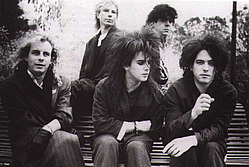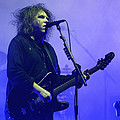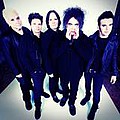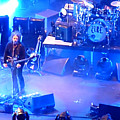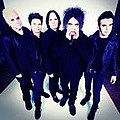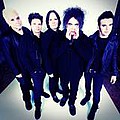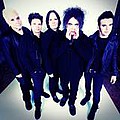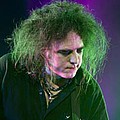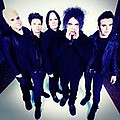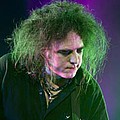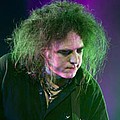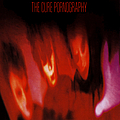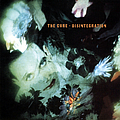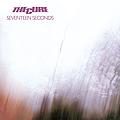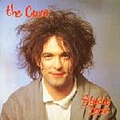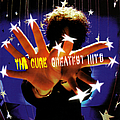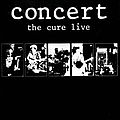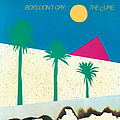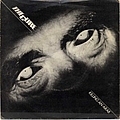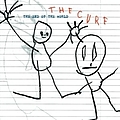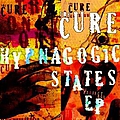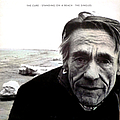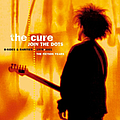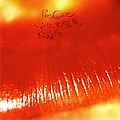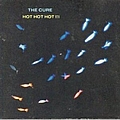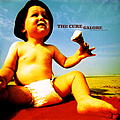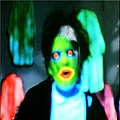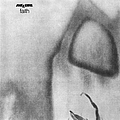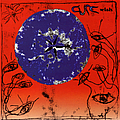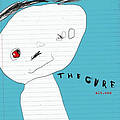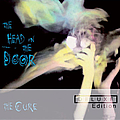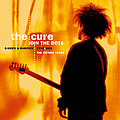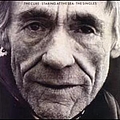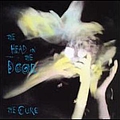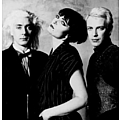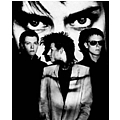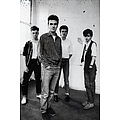The Cure Biography
The Cure is an alternative rock band which formed during the punk era of the 1970s in Crawley, England. The band started playing together in 1976 while Robert Smith and Laurence Tolhurst were still in secondary school. Their initial sound placed the band amongst the post-punk/New Wave movements while the darker music that followed, helped formulate the gothic rock genre that developed through the 1980s. The Cure have released thirteen studio albums and over thirty singles during the course of their career, and as of 2010 have sold 32 million albums worldwide. They remain one of the most enduring bands of the last thirty years, as proven by receiving the 'Godlike Genius' award at the Shockwaves NME Awards in February, 2009. The Cure has gone through several lineup changes, however, their current lineup resembles an early lineup consisting of founding member Robert Smith (vocals, guitar), original guitarist Porl Thompson (guitar), long-standing member Simon Gallup (bass) and Jason Cooper (drums). Smith is the only member who has continuously been in the band since its formation. The Cure's full lineup history is as follows: Robert Smith (Vocals & Guitar 1976-present), Lol Tolhurst (Drums & Keyboards 1976-1989), Michael Dempsey (Bass 1976-1979), Porl Thompson (Guitar & Keyboards 1976-1978, 1983-1992, 2005 -present), Simon Gallup (Bass & Keyboards 1979-1982, 1985-present), Matthieu Hartley (Keyboards 1979 -1980), Andy Anderson (Drums 1983-1984), Phil Thornalley (Bass 1983-1984), Boris Williams (Drums 1984-1994), Roger O'Donnell (Keyboards 1987 -1990, 1995-2005), Perry Bamonte (Guitar & Keyboards 1990-2005), Jason Cooper (Drums 1995-present). Just as the group's lineup has changed, the band's sound has evolved throughout the years, starting off as a post-punk band similar to Wire and Gang of Four before morphing into a gothic rock band in the early 80's, to a synthpop group in the mid-80's and a power-pop-alternative band in the early 90's. The Cure has always been an alternative and very independent band which was evident from the early days. Shunning the anarchistic tendencies of many punk bands after their formation in 1976 , The Cure's first release was Killing An Arab, based on material from French writer Albert Camus' "L'Etranger" (translated into English as The Stranger or The Outsider). This track courted controversy because of its theme (misinterpreted as racist, it was in fact, about the futility of killing any ethnicity), but it started to secure a small following, which grew following the release of debut album Three Imaginary Boys and non-LP single Boys Don't Cry in 1979, the latter of which would become one of The Cure's most famous songs. At that time, The Cure embarked on tour as the support for Siouxsie & The Banshees' Join Hands Tour. After the sudden departure of guitarist John McKay, Robert was recruited as guitarist for the Banshees as the band 'felt he was the only person capable of taking on the task.' As a result, Robert completed the tour playing two sets a night with The Cure and Siouxsie and the Banshees. Following this, The Cure moved from their punk leanings into the portentous post-punk territory, releasing three albums of doom-laden rock in three years, Seventeen Seconds, Faith and Pornography, the latter of which charted inside the UK top 10, though the band were repeatedly dogged by the "Second-class Joy Division" tag. Following their third set of line-up changes, the group released Japanese Whispers, a compilation of three singles and their b-sides. Through their desire to escape the Joy Division description, the singles were a poppier effort, featuring danceable tracks like Let's Go To Bed alongside pop songs like Love Cats. Following the commercial disappointment of follow-up album The Top in 1984, The Cure returned to form with 1985's The Head On The Door. Featuring the singles In Between Days and Close To Me, The Head On The Door was distant from the band's punk roots, having more in common with successful alternative bands like The Smiths and Echo & The Bunnymen than their gloomier roots. Two years later, the eighth studio album Kiss Me, Kiss Me, Kiss Me was a more stadium-sized effort, though featuring audacious pop songs like Why Can't I Be You, it was seemingly caught between two styles. However, it was the band's ninth effort (following the departure of last surviving founder member other than Robert Smith, Lol Tolhurst), Disintegration, that would be their greatest success, both critically and commercially. Disintegration spawned hit singles like Lullaby (no.5 in the UK), Love Song (an impressive no. 2 in the USA), Pictures Of You, and Fascination Street. The album itself was a culmination of The Cure's directions through the eighties, featuring the poppier side combined with the more tender aspects, as well as the gloomier facets. Following this, a remix compilation named Mixed Up was released in 1990, featuring one new track, Never Enough, and two years later tenth studio album Wish surfaced, which was a hit mainly from the momentum gained by Disintegration, though it also featured their most famous pop song, Friday I'm In Love (no.6 in the UK and no.18 in the US). During the years following this, the band became distracted and discouraged by the lawsuit launched by former member Lol Tolhurst, who felt he had been deprived of royalties. As a result, the 1996 album Wild Mood Swings felt unfocused, and was a critical and commercial failure, though the single Mint Car was a moderate hit. In 1997, The Cure released the compilation Galore, featuring new song Wrong Number. Three years later, at the release of original album Bloodflowers, Robert Smith announced it would be the last album for the band, the album itself being a return to the gloomier rock of Pornography and Faith. Resultantly, another hits compilation was released in 2001. However, in 2004, the band surprised all by returning with a self-titled album, their twelfth studio album, which was a surprise hit, reaching the US Top 10, its lead single - The End Of The World - becoming a modest hit on Modern Rock radio, and receiving a relatively warm reception from the press. In May 2005, Smith fired Roger O'Donnell and Perry Bamonte from the band, along with Bamonte's brother Daryl, who had been The Cure's tour manager for many years. The remaining members of the band (Robert Smith, longtime bassist Simon Gallup and Jason Cooper) made a few appearances as a trio before it was announced that founding member Porl Thompson would be returning to The Cure. Their thirteenth studio album was penciled in for the first quarter of 2007, but its release was postponed. They played one live concert in Miami (23 March 2007) at the unlikely dance-focussed Ultra Music Festival. Further concerts in 2007 followed in Australasia: Fuji Rock Festival, Japan (27 July); Hong Kong (30 July); Singapore (1 August) and a tour of Australia and New Zealand. The Australasian concerts were the first in the region since the Dream Tour of 2000 in support of Bloodflowers. These 4Tour dates featured a heavier, guitar-based sound (with Roger O'Donnell's departure The Cure's signature delicate guitar/keyboard layering also vanished) and no new songs were included in the sets. However, fans were treated to close to three hours of pure, classic The Cure, the band playing a long string of hits and fan-favourites before ending their shows with thrashing encores which delved into their back catalogue to some of their earliest recordings such as, Fire In Cairo, Grinding Halt and Three Imaginary Boys. An Autumn US tour was to follow but was eventually cancelled to enable the band to finish the recording and mixing of the new record. Despite the cancellation of the tour, four shows were played in October 2007, the last three in Mexico City. Here The Cure introduced a handful of new songs which displayed both the melodic/pop as well as the sombre/tender aspect of their songwriting. In 2008, The Cure embarked on the next leg of the 4Tour, starting in Stockholm (9 Feb) and continuing through to London (20 Mar) before heading across the Atlantic to complete the previously cancelled tour of 2007. The European 4Tour saw the band deliver powerful shows lasting over three hours, none more exhilarating and charged than their superb performance at Vienna's small-sized, 3000-capacity Gasometer (23 Feb). In Paris, Bercy (12 March), The Cure returned to the stage for an amazing fourth encore, ending the 3 hour 30 mins show with their emotional classic, Faith. In London (20 Mar), The Cure were again in top form, performing for over 3 hours and offering a great set including brilliant versions of A Night Like This, From The Edge Of The Deep Green Sea, Friday I'm In Love and Disintegration. Also notable was the magnificant, swirling guitar playing of Porl Thompson on the often over-looked Wrong Number and Never Enough, featuring a guitar-less and dancing Robert. The set included a large number of pop hits drawing a huge reaction from the crowd; amongst them: Hot Hot Hot !!!, The Lovecats, Close To Me and Why Can't I Be You?. New songs played were: The Only One (formerly known as Please Project), Freakshow (formerly known as Don't Say Anything) and the emotional A Boy I Never Knew. Finally, the 4Tour reached stateside in May/June 2008. The Cure again thrilled fans by playing epic yet energetic shows. Although the setlists on this leg of the tour followed a similar structure to those heard in Europe, the band also mixed in a few songs and encores that added a darker energy. To open and close the main set, the band occasionally played, Out Of This World and Bloodflowers whilst The Holy Hour, Other Voices, Faith and the rarely-played Forever entered their set as part of The Cure's hour-long three-section encores. A further glimpse of their forthcoming album was heard via the inclusion of more new songs: Underneath The Stars, The Perfect Boy, Sleep When I'm Dead and Baby Rag Dog Book. In addition to the recording of the Paris, France show, both the Charlotte, N.C. and New York City, N.Y. (Madison Square Garden) concerts were filmed for a possible TV/DVD release. In preparation for the release of their new album 4:13 Dream, The Cure released 4 singles and a remix EP in 2008. Starting with the long-awaited release of The Only One/NY Trip on May 13, each single was due to be released on the 13th of each month leading up to the release of the album. The artwork for the singles, The Only One/NY Trip, Freakshow/All Kinds Of Stuff, Sleep When I'm Dead/Down Under, The Perfect Boy/Without You and Hypnagogic States EP (remixes of all 4 singles), was produced by Porl Thompson and
Top The Cure Lyrics
Write a comment
What do you think about The Cure? Let us know in the comments below!
The Cure News & events
Top The Cure Albums
Similar artists
- The Smiths80s/Indie
- Depeche Mode80s/Electronic
- Echo & The Bunnymen80s/Indie
- Joy Division80s/Indie
- New Order80s/Electronic
- Clan Of XymoxElectronic
